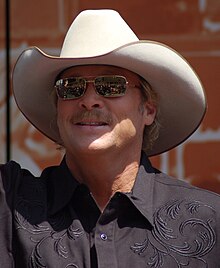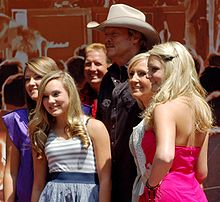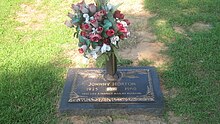John LaGale "Johnny" Horton (April 30, 1925 – November 5, 1960) was an
American country music and
rockabilly singer.
Rising to fame slowly over the course of the 1950s, Horton earned great
fame in 1959 performing historical ballads, beginning with the song "
The Battle of New Orleans" (written by
Jimmy Driftwood), which was awarded the 1960
Grammy Award for Best Country & Western Recording.
The song was awarded the
Grammy Hall of Fame Award and in 2001 ranked No. 333 of the
Recording Industry Association of America's "
Songs of the Century".
His first hit, a number 1 song in 1959, was "
When It's Springtime in Alaska (It's Forty Below)".
During 1960, Horton had two other successes with "
Sink the Bismarck" and "
North to Alaska" for
John Wayne's movie,
North to Alaska.
Horton died in November 1960 at the peak of his fame in an automobile
accident, less than two years after his breakthrough.
Horton is a member
of the
Rockabilly Hall of Fame and the
Louisiana Music Hall of Fame.
Early life
Horton was born in
Los Angeles,
to John Loly Horton (1889–1959) and the former Ella Claudia Robinson
(1892–1966), the youngest of five siblings, and reared in
Rusk in
Cherokee County in east
Texas.
His family often traveled to
California to work as migrant fruit pickers. After graduation from high school in
Gallatin, Texas, in 1944, Horton attended
Lon Morris Junior College in
Jacksonville, Texas, with a basketball scholarship.
He later attended
Seattle University and briefly
Baylor University in
Waco, although he did not graduate from any of these institutions.
[1]
Horton soon returned to California. where he got a job in the mail room at
Selznick International Pictures.
His future wife, Donna Cook, was working at the studio as a secretary
at the time.
After a short stint studying geology in Seattle in 1948,
Horton went to Alaska to look for gold.
It was during this period that
he began writing songs. Returning south, he entered and won a talent
contest in
Henderson, Texas.
Encouraged by this result, he returned to California to pursue a music career.
[1]
His guest appearances on
Cliffie Stone's
Hometown Jamboree on
KXLA-TV in
Pasadena and his own half-hour show
The Singing Fisherman
led to the opportunity to record some songs on the Cormac record label.
By the time the company folded in 1952, Horton recorded ten singles for
that label. Fabor Robison, owner of
Abbott Records, acquired the masters.
Around this time Horton married Donna Cook.
[1]
Louisiana Hayride and early career
By this time Horton was appearing regularly on
Louisiana Hayride, so he and Donna moved to
Shreveport, Louisiana, where the show was recorded.
He also signed a contract with
Mercury Records
and began recording. His first song for that label, "First Train
Headin' South" b/w "(I Wished for an Angel) The Devil Sent Me You"
(Mercury 6412), received good reviews.
He and his new backup band, the
Rowley Trio, began touring under the name The Singing Fisherman and the
Rowley Trio in 1952, eventually changing the name to Johnny Horton and
the Roadrunners.
The group included Horton as lead singer, Jerry Rowley
on fiddle, his wife Evelyn on piano, and his sister Vera (Dido) on
guitars.
The constant touring was hard on Horton's marriage, and Donna
moved back to Los Angeles.
They were soon divorced.
[1]
On September 26, 1953, Horton married
Billie Jean Jones, widow of
Hank Williams, who had died January 1, 1953.
Horton parted ways with the Rowley trio, but continued to appear occasionally on
Louisiana Hayride.
His contract with Mercury expired in late 1954, with his recording of
"All for the Love of a Girl" (Mercury 70227) being his best seller, at
35,000 to 45,000 copies.
Horton, always an avid fisherman, got a job in a
tackle shop and put his music career on hiatus. But by the following
year, his new manager and bassist
Tillman Franks had obtained Horton a one-year contract with
Columbia Records.
They traveled to
Nashville, Tennessee in a borrowed car for their first recording session. Influenced by the work of
Elvis Presley, Horton began adopting a more
rockabilly style.
[1]
"Honky-Tonk Man" and later career
"
Honky-Tonk Man"
was recorded on 11 January 1956 at the Bradley Barn Studio in
Nashville, one of four songs Horton recorded that day.
Session musicians
on the recording were
Grady Martin and
Harold Bradley, as well as
Bill Black
(at the time Presley’s bassist).
Soon afterwards "Honky-Tonk Man" was
released as a single (Columbia label: 4-21504) paired with another song
from the same session, "I'm Ready if You're Willing".
They went out on
tour, with the band featuring Franks on bass and
Tommy Tomlinson on guitar.
[1]
"Honky-Tonk Man" was reviewed by the March 10 issue of
Billboard,
which said of "Honky Tonk Man", "The wine women and song attractions
exert a powerful hold on the singer, he admits. The funky sound and
pounding beat in the backing suggest the kind of atmosphere he
describes. A very good jukebox record."
[1]
Their review of "I'm Ready if You're Willing" was also positive:
"Horton sings out this cheerful material with amiable personality.
This
ever more popular stylist ought to expand his circle of fans with this
one."
[1]
The song peaked at No. 9 on the C&W Jockey chart (now
Hot Country Songs) and at No. 14 on the Best Seller chart.
[1]
Horton returned to the studio on May 23, but the "A" side of his next
single, "I'm a One Woman Man" (Columbia 21538), was one of the songs
recorded back in January. The "B" side was "I Don't Like I Did".
Billboard
described "One Woman Man" as a "Smart and polished job," and Horton as
"singing with a light, airy touch. Guitar work is just as convincing,
adding up to listenable, commercial stuff".
[1]
He and his band toured through the United States and Canada to promote
the record, which reached No. 7 on the Jockey chart and No. 9 on the
Best Seller and Jukebox charts.
[1]
"I'm Coming Home" / "I Got A Hole In My Pirogue" (Columbia 40813) was released around this time as well.
On February 9,
Billboard
noted that "not only Southern markets are doing good business with
this, but Northern cities report that both country and pop customers are
going for this in a big way".
[1]
It was again a success on the country charts (No. 11 Jockey, No. 15
Best Seller) but it failed to score the popular music charts.
Later major successes include the song "
The Battle of New Orleans" (written by
Jimmy Driftwood), which was awarded the 1960
Grammy Award for Best Country & Western Recording.
The song was awarded the
Grammy Hall of Fame Award and in 2001 ranked No. 333 of the
Recording Industry Association of America's "
Songs of the Century".
Horton had two other successes in 1960 with "
Sink the Bismarck" and "
North to Alaska" for
John Wayne's movie,
North to Alaska.
Legacy
When
Johnny Cash, a good friend of Horton's, learned about the accident he
said, "[I] locked myself in one of the hotel's barrooms and cried."
[2]
Cash dedicated his rendition of "
When It's Springtime in Alaska (It's Forty Below)" to Horton on his album
Personal File: "Johnny Horton was a good old friend of mine."
Horton was inducted into The
Louisiana Music Hall of Fame and posthumously inducted into the
Delta Music Museum Hall of Fame in
Ferriday, Louisiana.
Some racist songs have sometimes been incorrectly associated with Horton. These songs are by a singer calling himself "
Johnny Rebel,"
who did not begin recording until after Horton's death.
The mistake is
apparently because Horton recorded the historical song "Johnny Reb."
[3][4]
Personal life
Horton
was married twice. His first marriage, to Donna Cook, ended with a
divorce granted in Rusk, Texas.
In September 1953, he married
Billie Jean Jones, the widow of country music singer
Hank Williams.
(She was Williams' second wife.)
With Billie Jean, Horton had two
daughters, Yanina (Nina) and Melody. Billie Jean's daughter, Jeri Lynn,
was legally adopted by Johnny.
Death
On the night of November 4–5, 1960, Horton and two other band members
(Tommy Tomlinson and Tillman Franks) were travelling from Austin to
Shreveport when they collided with an oncoming truck on a bridge near
Milano, Texas.
Horton died en route to hospital, and Tomlinson was seriously injured;
his leg later had to be amputated.
Franks suffered head injuries, and
James Davis, the driver of the truck, had a broken ankle and other minor
injuries.
[1]
The funeral was held at Shreveport on November 8, 1960, officiated by
Tillman Franks' younger brother, William D. "Billy" Franks, a
Church of God minister.
Johnny Cash did one of the readings, choosing Chapter 20 from the Book of John.
[1]
Horton is interred, with a cemetery bench in his honor, at the Hillcrest Memorial Park and Mausoleum in
Haughton, east of
Bossier City in northwestern Louisiana.
Source: Wikipedia.org
Somebody Come and Play in Traffic with Me! Earn as You Learn, Grow as You Go!
The Man Inside the Man
from
Sinbad the Sailor Man
A
JMK's Production
Share this page, If you liked It Pass it on, If you loved It Follow Me!
TTFN
CYA Later Taters!
Thanks for watching.
Donnie/ Sinbad the Sailor Man
Somebody Come and Play in "Traffic" with me. If you would like to "Join" A Growing Biz Op! Here is Your Chance to get in an Earn While You Learn to Do "The Thing" with us all here at Traffic Authority.







